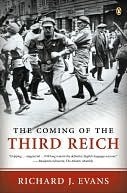More on this book
Community
Kindle Notes & Highlights
Started reading
April 7, 2025
‘A statesman cannot create anything himself. He must wait and listen until he hears the steps of God sounding through events; then leap up and grasp the hem of his garment’.4 Bismarck knew that he could not force events into any pattern that he wanted. If, then - to adopt another of his favourite metaphors - the art of politics consisted in navigating the ship of state along the stream of time,
succeeded. Among the many aspects of his creation that survived the fall of Bismarck’s German Reich in 1918, the continued use of the term ‘German Empire’, Deutsches Reich, by the Weimar Republic and all its institutions was far from being the least significant. The word ‘Reich’ conjured up an image among educated Germans that resonated far beyond the institutional structures Bismarck created: the successor to the Roman Empire; the vision of God’s Empire here on earth; the universality of its claim to suzerainty; in a more prosaic but no less powerful sense, the concept of a German state that
...more
that Bismarck was appointed in 1862. He immediately announced that ‘the great questions of the day are not decided by speeches and majority resolutions - that was the great mistake of 1848 and 1849 - but by iron and blood’.
The war of 1866 destroyed the Kingdom of Hanover, incorporating it into Prussia, and expelled Austria and Bohemia from Germany after centuries in which they had played a major part in shaping its destinies, while the war of 1870-71 took away Alsace-Lorraine from France and placed it under the direct suzerainty of the German Empire. It is with some justification that Bismarck has been described as a ‘white revolutionary’.14 Military force and military action created the Reich; and in so doing they swept aside legitimate institutions, redrew state boundaries and overthrew long-established
...more
Militarism in state and society was to play an important part in undermining German democracy in the 1920s and in the coming of the Third Reich.
In 1904-7, in an act of deliberate genocide, the German army massacred thousands of Herero men, women and children and drove many more of them into the desert, where they starved. From a population of some 80,000 before the war, the Hereros declined to a mere 15,000 by 1911 as a result of these actions.21 In an occupied part of the German Empire such as Alsace-Lorraine, annexed from France in 1871, the army frequently behaved like conquerors facing a hostile and refractory population. Some of the most flagrant examples of such behaviour had given rise in 1913 to a heated debate in the
...more


